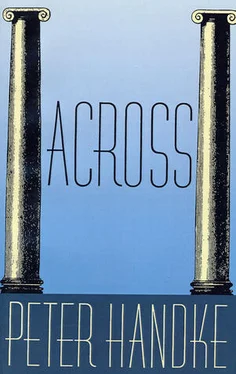Peter Handke - Across
Здесь есть возможность читать онлайн «Peter Handke - Across» весь текст электронной книги совершенно бесплатно (целиком полную версию без сокращений). В некоторых случаях можно слушать аудио, скачать через торрент в формате fb2 и присутствует краткое содержание. Год выпуска: 2000, Издательство: Farrar, Straus and Giroux, Жанр: Современная проза, на английском языке. Описание произведения, (предисловие) а так же отзывы посетителей доступны на портале библиотеки ЛибКат.
- Название:Across
- Автор:
- Издательство:Farrar, Straus and Giroux
- Жанр:
- Год:2000
- ISBN:нет данных
- Рейтинг книги:3 / 5. Голосов: 1
-
Избранное:Добавить в избранное
- Отзывы:
-
Ваша оценка:
- 60
- 1
- 2
- 3
- 4
- 5
Across: краткое содержание, описание и аннотация
Предлагаем к чтению аннотацию, описание, краткое содержание или предисловие (зависит от того, что написал сам автор книги «Across»). Если вы не нашли необходимую информацию о книге — напишите в комментариях, мы постараемся отыскать её.
Across — читать онлайн бесплатно полную книгу (весь текст) целиком
Ниже представлен текст книги, разбитый по страницам. Система сохранения места последней прочитанной страницы, позволяет с удобством читать онлайн бесплатно книгу «Across», без необходимости каждый раз заново искать на чём Вы остановились. Поставьте закладку, и сможете в любой момент перейти на страницу, на которой закончили чтение.
Интервал:
Закладка:
Next day, on a bus ride to the interior, I tried the same game with a baby. His face propped on the shoulder of a woman sitting in the row ahead of me, he evidently couldn’t take his eyes off me; when I looked back, the baby, as though I had seen through him, finally showed his profile and took refuge in his mother’s neck; yet at the same time he grinned as though relieved to be seen through. Mother and child formed a Janus head. On Sunday morning, on my return to the coast, I passed the home again; Mass was being said in the open, under a canopy of trees. Once, a lizard fell out of a tree and landed on the priest’s shoulder. When he raised the white wafer, it was veined with shadows like a setting sun. During the sermon, the acolyte played with a spider. The idiots waved their arms, clapped loudly, and interrupted with inarticulate gurgling, cackling, grunting, and groaning. A sparrow preening itself in a dusty hollow turned into every conceivable animal: a mouse, a crow, a rooster, a lion, a dolphin, a picture puzzle. The sea off Alghero glittered in far-flung arcs, lines, and loops, like longhand script. On a block of salt beside it sat a caged parrot, who didn’t say boo.
It was no dream that, some days late, I reported back to school in Salzburg. My friend in the principal’s office just said: “It doesn’t matter,” took me to my classroom, and opened the door for me. On the way, he had given me a long look, evidently undecided whether to regard me as a lost soul and failure or as a man changed for the better.
The building, formerly an imperial cavalry barracks, is on a bank of the Salzach. The room with its high walls was very bright. I have never seen eyes of so many different colors, and I thought them all beautiful. The class was strangely quiet, until I said: “Why don’t you misbehave? Come on, misbehave a little.” My pupils thought I was creepy, and not for the first time, I imagine.
The whitish steam rising from the chimney of the municipal power plant on the opposite bank showed the direction of the wind. By the sounds on the railroad bridge, one could tell what sort of train was crossing: the passenger trains purred and hummed, the freight trains rumbled, and from time to time one heard the clatter of a shunting engine.
I felt happy to be there; to be there not permanently but for the present. I leaned out of the open window, looked upstream, and saw the spray of an arm of the Alm Canal, which drops like a waterfall into the Salzach. For a moment there was a light over the city, which imparted a pastel hue to all the buildings, even the massive walls of the castle. The whole produced the effect not of a backdrop or façade but of a quiet, festive fairyland. Yet it seemed to me that something was gone forever. A part of me had fallen off the cliff with the stoned man. I was no longer among the players, or else I was playing a different game; or, at best, competing for some consolation prize. Melancholy was in the world; it was the reality which deformed and discolored the world. A monstrous picture from Sardinia came into my mind. A colony named Fertilia, built by the dictator’s henchmen in the years between the wars: today not a single house has a threshold and the doors to the houses are gaping holes. “Stinking rabble!” I said aloud at my table in the faculty room, which had formerly been the guardroom of the barracks. Someone at the next table retorted: “That will do, Loser.” When I looked up, I noticed for the first time that I was one of the older men in the room.
I began my last class of the day by saying: “The Greek word lalein corresponds to the German lallen (to babble, talk inarticulately). But the poet also calls pebbles lallai. ” I was standing at the window, I saw the spring flow of the river; the wind had drawn a dense pattern of lengthwise stripes extending to both horizons — a regatta of emptiness. I shall be without love, I thought. Shall I be without love? In any case, I shall never again be secure.
Suddenly my melancholy changed to something radically different: to something unprecedented, legendary, unheard-of, and yet instantly convincing. Its name was loneliness and what filled me with enthusiasm was not loneliness considered as my fate but the phenomenon of loneliness. What made the word convincing was an image: outside a house in the early-morning light, I saw the shortest banister in the world, hardly the length of a hand, made for a single step; but it was curved and brightly polished and sparkled in the clear air.
A few days later, I had a powerful little experience in the Oak Tree Colony supermarket. (It is the basis of the present tale.) No doubt as a precaution against shoplifters, a tilted mirror is fitted to the ceiling, and chancing to look up, I saw my face in it. People are always saying that children take after their parents. But what struck me at that moment was the contrary; it is not, as others have sometimes observed, my son who resembles me, but I, the adult, who resemble my son. Ordinarily, resemblances between forebears and descendants strike me as distasteful, if not outrageous; but this resemblance was the opposite; and it would never be noticed by anyone but me. It had to do not with the features but with the eyes, not their shape or color, but their gaze, their expression. Here, I said to myself, I see my innermost being, and for a moment I felt acquitted. In the far corner of the supermarket, in the meat department, two white-clad women were standing in total silence. A car rumbled over the planks of the canal bridge. Outside the display window, there was a great brightness; a vault of light spanned the bridge. But this gaze, I asked myself a little while later — what was it like? And the answer: Wounded.
The following weekend, I went to Gois to see my family. “Gois, Wals, and Siezenheim are good,” it is said concerning the three villages on the western fringe of the plain — meaning that they are situated beyond the relatively barren bog. No one was home just then. I went to the toolshed and whetted the scythes, which had rusted during the winter; then I went out to the orchard and mowed the first grass.
The orchard with its many trees and their often interlocking branches is a strange setting for the small “teacher’s house,” for which flower beds and a lawn would be more suitable. The yellow front is covered by an empty trellis, on which heart-shaped apricots were formerly grown. The whole house seems to have been transplanted from somewhere, from a suburb or residential area of the city, to this remote village. In the bay tree beside the front door — dark green, with translucent veins — linden blossoms, maple spores, and bits of straw from the neighboring fields have come to rest.
It was a rainy afternoon in early May. I chopped wood in the woodshed, hoed the grapevines, which were already putting forth fluffy leaves. Then, at the far end of the garden, I sat down on a grassy knoll which the trees had sheltered from the rain. For a moment, the setting sun appeared.
First my daughter arrived, accompanied by another girl. She had her own key, and the two went into the house without noticing me. Up until then, the stairway had been dark and deserted; now a light went on and legs ran up the stairs. Two heads propped on hands appeared in the open dormer window; pop music rang out, and was softened by the faces of the two listeners; I myself had once had an ear for such music. The girls whispered, giggled, scolded, enjoyed themselves; their foreheads, cheeks, throats, and shoulders had the bloom of demanding yet modest, patient yet self-confident brides awaiting their bridegrooms. 0 rejuvenated world.
My daughter’s mother’s car stopped outside the house. She had seen me from the distance and waved. She had treated herself, she informed me, to a little trip across the border, to the Chiemsee, and had taken the boat out to the islands. “Nobody ever comes to see us here in Gois.” In the rain, on Frauenchiemsee Island, she had felt so secure that a shudder ran through her. There was a telephone booth in the middle of the lake. A drunk had looked at her “as if he were blind in one eye.” In the rainy mist, “the lakeshore had been something like a northern ocean.”
Читать дальшеИнтервал:
Закладка:
Похожие книги на «Across»
Представляем Вашему вниманию похожие книги на «Across» списком для выбора. Мы отобрали схожую по названию и смыслу литературу в надежде предоставить читателям больше вариантов отыскать новые, интересные, ещё непрочитанные произведения.
Обсуждение, отзывы о книге «Across» и просто собственные мнения читателей. Оставьте ваши комментарии, напишите, что Вы думаете о произведении, его смысле или главных героях. Укажите что конкретно понравилось, а что нет, и почему Вы так считаете.












